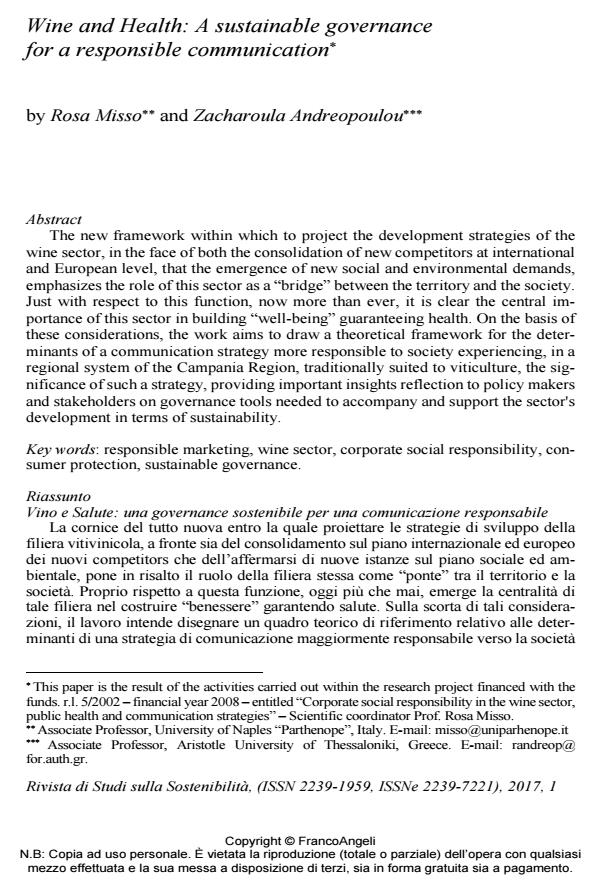Wine and Health: A sustainable governance for a responsible communication
Journal title RIVISTA DI STUDI SULLA SOSTENIBILITA'
Author/s Rosa Misso, Zacharoula Andreopoulou
Publishing Year 2017 Issue 2017/1
Language English Pages 15 P. 91-105 File size 224 KB
DOI 10.3280/RISS2017-001007
DOI is like a bar code for intellectual property: to have more infomation
click here
Below, you can see the article first page
If you want to buy this article in PDF format, you can do it, following the instructions to buy download credits

FrancoAngeli is member of Publishers International Linking Association, Inc (PILA), a not-for-profit association which run the CrossRef service enabling links to and from online scholarly content.
The new framework within which to project the development strategies of the wine sector, in the face of both the consolidation of new competitors at international and European level, that the emergence of new social and environmental demands, emphasizes the role of this sector as a "bridge" between the territory and the society. Just with respect to this function, now more than ever, it is clear the central importance of this sector in building "well-being" guaranteeing health. On the basis of these considerations, the work aims to draw a theoretical framework for the determinants of a communication strategy more responsible to society experiencing, in a regional system of the Campania Region, traditionally suited to viticulture, the significance of such a strategy, providing important insights reflection to policy makers and stakeholders on governance tools needed to accompany and support the sector's development in terms of sustainability.
Keywords: Responsible marketing, wine sector, corporate social responsibility, consumer protection, sustainable governance.
- Corporate governance and the environment in the health sector: Systematic literature review Isabel Cristina Panziera Marques, Zélia Maria da Silva Serrasqueiro Teixeira, Fernanda Maria Duarte Nogueira, in Journal of Governance and Regulation /2020 pp.8
DOI: 10.22495/jgrv9i2art1 - The circular economy: A broader perspective for rural areas Rosanna Salvia, Zacharoula S. Andreopoulou, Giovanni Quaranta, in RIVISTA DI STUDI SULLA SOSTENIBILITA' 1/2018 pp.87
DOI: 10.3280/RISS2018-001008
Rosa Misso, Zacharoula Andreopoulou, Wine and Health: A sustainable governance for a responsible communication in "RIVISTA DI STUDI SULLA SOSTENIBILITA'" 1/2017, pp 91-105, DOI: 10.3280/RISS2017-001007